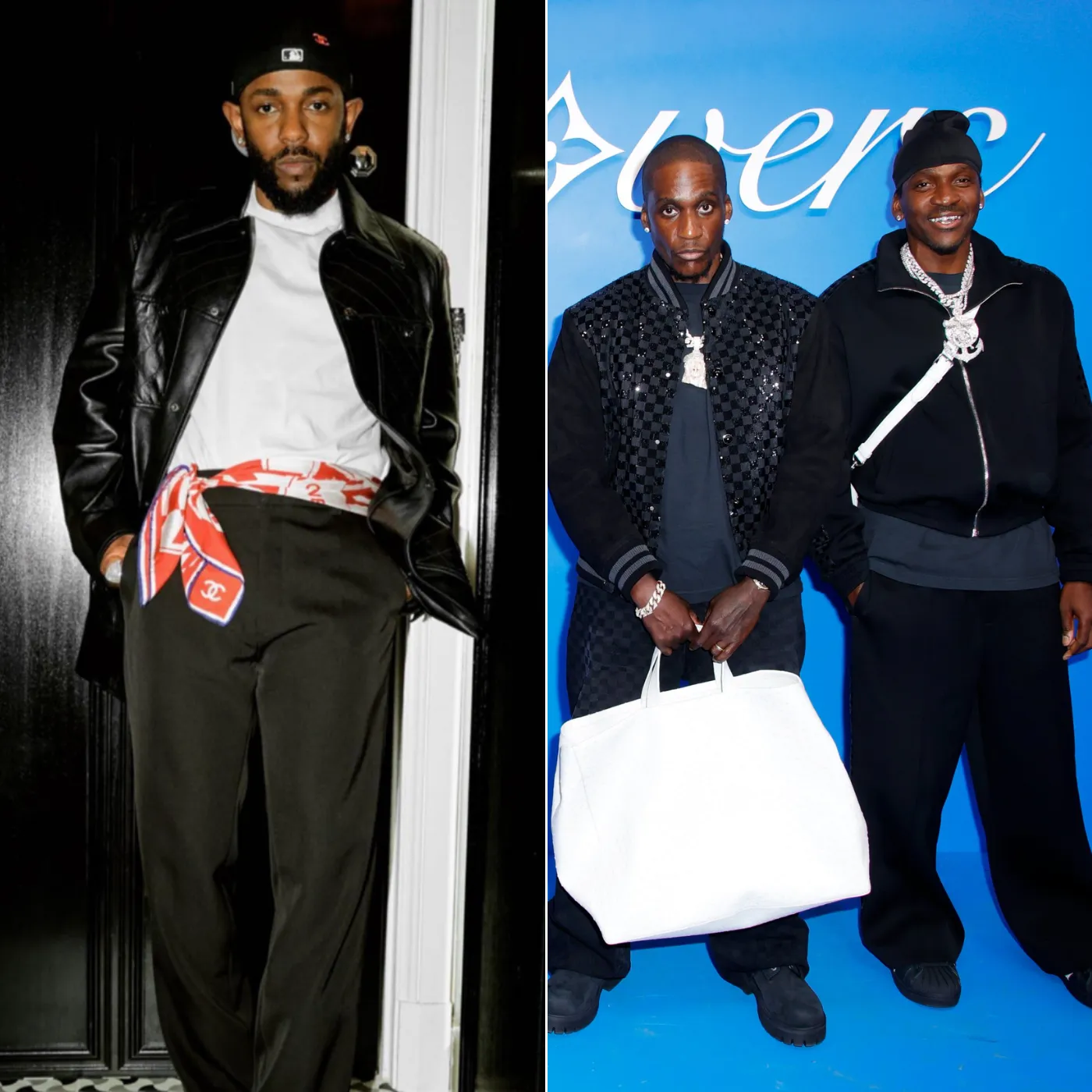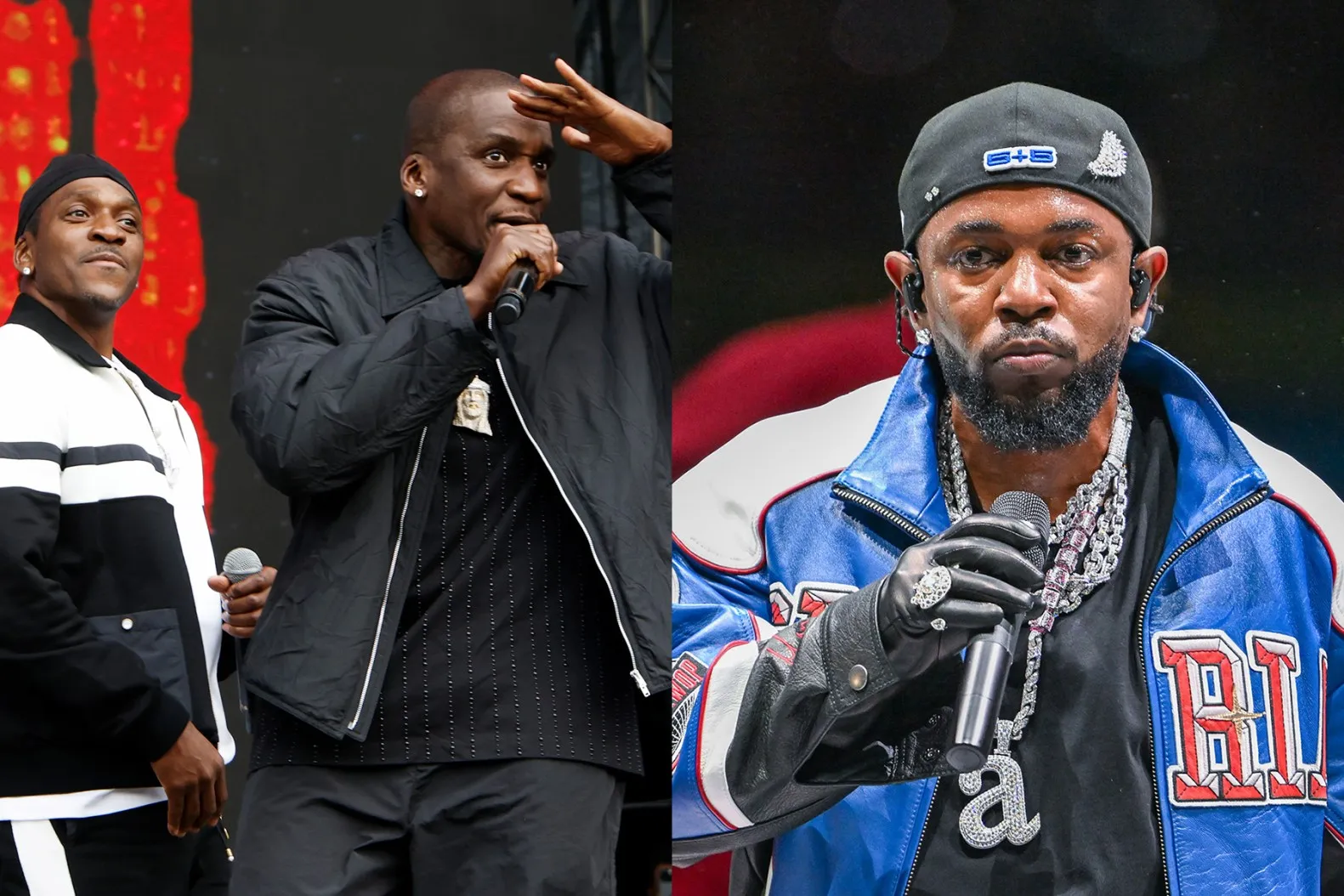

Daring to Keep Kendrick Lamar on the Tracklist, Pusha T & Clipse Get ‘Kicked Out’ by UMG – What’s Going On?
The music industry is no stranger to drama, especially when it involves the powerful forces of record labels and artist collaborations. Recently, the hip-hop world was shaken by a surprising controversy surrounding Pusha T, the iconic duo Clipse, and the music giant Universal Music Group (UMG). The root of this storm? The decision by Pusha T and Clipse to include the legendary Kendrick Lamar on their new tracklist, which reportedly led to UMG “kicking them out” or pulling their support. But what exactly transpired behind the scenes? Why would UMG react so strongly over Kendrick Lamar’s presence? And what does this mean for the artists involved and their fans?

To understand this incident, we need to delve deeper into the complex relationships between artists, record labels, and the business politics that often shape creative decisions. This article will explore the backstory, the implications of the dispute, and the broader context of artistic freedom in today’s music industry.
The Unexpected Collaboration: Kendrick Lamar Joins Pusha T & Clipse
Pusha T, known for his razor-sharp lyricism and business acumen, alongside his brother No Malice in the duo Clipse, have consistently been major forces in hip-hop for over two decades. Their reputation for raw storytelling and uncompromising artistry has earned them a dedicated following and respect among peers.
Enter Kendrick Lamar, often hailed as one of the greatest lyricists of his generation and a heavyweight with critical acclaim and commercial success. Having Kendrick on any track instantly elevates its profile. So when news leaked that Kendrick Lamar was featured on Pusha T and Clipse’s new project, anticipation among fans skyrocketed.
However, beneath the excitement, trouble was brewing.
Why Did UMG Oppose Kendrick’s Feature?
The surprising twist is that Universal Music Group, Pusha T and Clipse’s label, reportedly opposed Kendrick Lamar’s inclusion on the tracklist. This opposition is not just about music preference — it reveals the complicated, often opaque business strategies that govern music releases.
Several sources suggest that UMG viewed Kendrick Lamar’s feature as a potential risk. This risk might stem from contract conflicts, marketing strategies, or licensing issues. Kendrick is signed to different label arrangements, including Interscope Records under the Universal umbrella but with its own contractual terms and artistic controls. Sometimes, labels restrict collaborations to maintain control over artist branding, revenue streams, or timing of releases.
Another angle is the business politics within UMG itself, which owns multiple sub-labels and has many high-profile artists. The company might be managing competing interests between different artists or projects, fearing that Kendrick’s involvement could overshadow or conflict with other UMG priorities.
For Pusha T and Clipse, standing firm on keeping Kendrick Lamar on their tracklist meant defying their label’s directive. This bold stance led to escalating tensions.
The Fallout: ‘Kicked Out’ by UMG
The phrase “kicked out” or “thrown out” may sound dramatic, but it captures the gravity of what reportedly happened. By refusing to remove Kendrick’s feature, Pusha T and Clipse allegedly faced serious repercussions from UMG, including losing support for their project or being effectively sidelined within the label’s roster.
Losing backing from a major label like UMG can be devastating for artists. It affects:
-
Distribution and Promotion: Without label support, albums may not reach the same wide audience or get marketing pushes.
-
Funding: Production, video shoots, tours, and other costly elements may be underfunded.
-
Industry Access: Labels often facilitate media appearances, collaborations, and award opportunities.
For artists of Pusha T and Clipse’s caliber, such a fallout is significant. It not only impacts the immediate project but potentially jeopardizes future contracts and collaborations.
The Clash Between Artistic Freedom and Corporate Control
At the heart of this dispute is a recurring tension in the music industry: the struggle between artistic freedom and corporate control. Artists want to make music that feels authentic and pushes boundaries, but labels are businesses that prioritize profitability, brand management, and strategic planning.
Kendrick Lamar is known for his thoughtful, complex artistry that often addresses social and political issues. Pusha T and Clipse have built their careers on uncompromising lyrical content. To exclude Kendrick purely due to label politics contradicts the very spirit of creativity these artists embody.
This situation raises questions about the role of labels in shaping music culture. Should record companies have the power to veto collaborations based on business concerns, even when it limits artistic vision? Or should artists have the final say over their creative choices, even if it means taking risks with their careers?
How Fans and the Industry Are Reacting
Fans of Pusha T, Clipse, and Kendrick Lamar have expressed shock and frustration over the news. Social media has been abuzz with debates about label overreach and artist autonomy. Many see this as an example of how major corporations can stifle creativity for short-term gain.
Within the industry, opinions vary. Some executives emphasize the importance of contractual obligations and protecting investments. Others sympathize with the artists’ desire for freedom and collaboration.
This controversy also spotlights the growing trend of artists seeking alternative ways to release music — through independent platforms, direct fan engagement, or creative partnerships outside traditional label frameworks.
Potential Outcomes and What’s Next for Pusha T & Clipse
Despite the challenges, Pusha T and Clipse’s defiance could mark a turning point. It may push them toward greater independence or renegotiation of label terms. Alternatively, it might inspire other artists to assert their creative rights more boldly.
For Kendrick Lamar, this incident is unlikely to affect his career trajectory, but it underscores how even top-tier artists can be caught in label politics.

Industry watchers will be keen to see how UMG responds — whether they relent, seek compromise, or double down on their stance.
Broader Implications for the Music Industry
This episode is not isolated. It reflects a broader struggle in the digital age where artists wield more power thanks to streaming and social media, yet still depend heavily on traditional labels for infrastructure and financing.
Labels face pressure to innovate their business models while maintaining control over their assets. Artists face decisions about balancing commercial success with artistic integrity.
The Pusha T, Clipse, Kendrick Lamar, and UMG conflict serves as a microcosm of these industry dynamics — highlighting the challenges and opportunities ahead.
Conclusion: The Battle Between Art and Commerce
The saga of Pusha T and Clipse daring to keep Kendrick Lamar on their tracklist, despite UMG’s resistance, is a vivid example of the ongoing battle between creative expression and corporate interests in music.
While labels play an important role in amplifying artists’ voices, situations like this reveal the limits of that support when business concerns clash with artistic vision. For fans and artists alike, it’s a reminder that behind every tracklist lies complex negotiations, power struggles, and the delicate balance between art and commerce.
Ultimately, this story may encourage more artists to take control of their creative destinies, redefining how music is made, shared, and celebrated in the years to come.


















